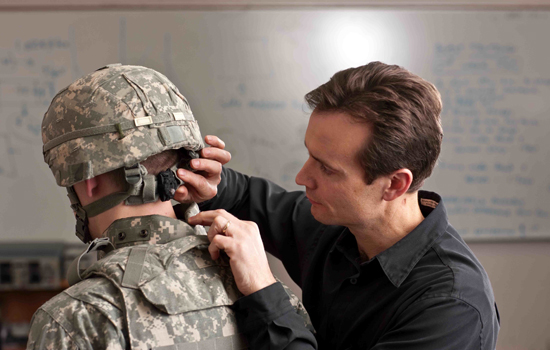BlackBox Biometrics receives major contract
Myers Creative Imaging
David Borkholder adjusts one of the blast gauge devices on a soldier’s helmet. The device can help assess impact from explosive devices.
RIT engineering faculty member David Borkholder and his company, BlackBox Biometrics Inc., received a $9.4 million contract from the U.S. Department of Defense to help manufacture the next-generation of the Blast Gauge System.
Borkholder, the Bausch and Lomb Professor of Microsystems Engineering in RIT’s Kate Gleason College of Engineering, is the founder and chief technology officer of the Rochester-based company. His team developed the Blast Gauge wearable sensor technology for detecting concussive forces that can lead to head trauma for active-duty service members several years ago at the university. It has been deployed on Brigade Combat Teams serving in Afghanistan and used by U.S. Special Forces units as well as law enforcement organizations across the nation.
The award is intended to increase usage and will support the U.S. Army’s transition to the newest model of the Blast Gauge System. The award follows successful completion of rigorous testing completed by the U.S. Army Aberdeen Test Center to qualify the new model. Congresswoman Louise Slaughter, (D-Fairport), worked with BlackBox Biometrics and the DOD to move the procurement process forward and secure the grant that will support 15 existing jobs at the company and allow them to create eight new positions in Rochester’s high-tech manufacturing sector.
“This award enables the BlackBox Biometrics team to continue supporting America’s servicemembers with the latest technology to monitor pressure and acceleration based concussive forces,” said Borkholder. “Key advancements in this Army-approved model will further the ability to identify individuals at risk of traumatic brain injury.”
The Blast Gauge System project was originally funded by the U.S. Defense Advanced Research Projects Agency in 2010. Borkholder and a team of students and partners delivered 1,000 units to the department and they were immediately deployed in Afghanistan. Many of the device components were built, assembled and tested at RIT. Borkholder started BlackBox Biometrics in 2011 and continued production of the devices. The company used similar technology as it developed another device that measures whether an athlete may be at risk for a concussion—the Linx Impact Assessment System (IAS). This system was introduced this past January at the Consumer Electronics Show in Las Vegas, where it received three CES Innovation Honoree Awards. Linx IAS uses a device about the size of a stick of gum that slides into a headband or skullcap. The device measures how hard and how many times an athlete is hit in the head—and sends that data in real-time to a mobile app.
“Rochester is leading the world in advanced manufacturing and I am pleased to have helped secure this substantial investment in our growing technology sector,” said Slaughter in a statement. “This announcement will not only help create good-paying jobs right here in Monroe County, but help ensure our men and women in uniform continue to have access to this state-of-the-art technology so we can identify those at risk of traumatic brain injuries.”
BlackBox Biometrics was formed out of a research project originating at RIT’s Venture Creations business incubator, where young companies are able to advance their concepts to become profitable, viable businesses and use resources such as coaching, networking and connections to potential investors. The company graduated from the incubator in 2014.
Related articles
Blast Gauge delivers critical data
Professor creates technology to help reduce sports concussion injuries















